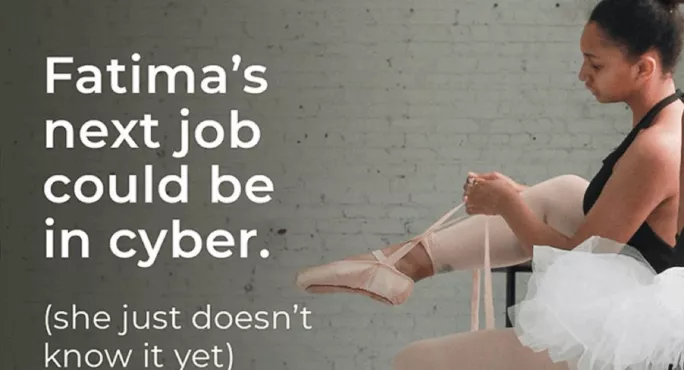- Home
- Why school arts could save Fatima’s ballet career
Why school arts could save Fatima’s ballet career

Most people are now aware of Fatima the ballet dancer. Fatima may love dancing, but a government recruitment advert seems to think that the easiest way to fix her cash-flow problem is to suggest that she retrain to work “in cyber”.
Meanwhile, the government has announced that teacher-training bursaries for arts subjects - such as English, music and art and design - are to be dropped.
Recently, 400 musicians gathered outside Parliament to highlight the plight of the music industry during the current pandemic. Their performance of Mars, the Bringer of War, from Holst’s The Planets, was designed to pressure the government into giving more support to self-employed artists.
This matters, because freelance musicians make up 72 per cent of the sector, with almost half of them not eligible for government grants. Chancellor Rishi Sunak has decided that the government is only backing “viable” jobs, and apparently being a highly skilled professional within the arts sector isn’t viable. So, in short, musos and thespians are a bit 2019, and need to retrain.
Figures suggest that 296,000 people are working in the music, performing and visual arts industry. I am sure Rishi Sunak wasn’t saying that Adele needs to become a hairdresser, but he inadvertently said that wannabe Spice Girls should perhaps really, really want a different career.
Coronavirus: Are arts subjects no longer ‘viable’?
But what sort of message is this sending out to young people aspiring to work in the arts? Sadly, the number of students taking A levels in the arts continues to fall. While art and design feature in the top 10 subjects taken at A level in 2019, the top punchers were Stem-based subjects: mathematics, biology, psychology and chemistry.
Many schools cannot run certain A-level subjects because they don’t have enough students to take the course - meaning that it’s not viable to run it. As we go on, the word “viable” seems to become the word of the year, and we begin to descend a slippery slope into somewhere very depressing.
Yes, the arts are important, but Stem subjects are also important and, during a pandemic, we rely on our Stem-ists more than ever. I watched Sir Patrick Vallance and Professor Chris Whitty during the daily coronavirus briefings. I have hung on their every word, mesmerised by the world of science that we are so heavily reliant on right now, and ever hopeful that they will have the answer as to how to boot this thing into touch and allow our artists back on the stage again.
Thank goodness that, with so many young people taking Stem subjects at A level, our scientific future is in good hands. But - and there is a but - what about the arts? We need them, too.
For those of you who are dubious about the arts, I presume you watch Netflix? You’ll need the arts to fuel your next binge of Selling Sunset.
Professionally, the arts are taking a battering. In schools, too, the arts - and especially music - have been battered. There are thousands of amazingly creative teachers, reinventing the curriculum as they are compelled to deliver lessons in non-specialist classrooms, with limited or no access to equipment. It’s fair to say that there isn’t a lot that can be done about this at the moment.
School leaders have done their best. And, with such stringent guidelines, there isn’t much wiggle room to facilitate a class set of keyboards, a hacksaw or 30 palettes of acrylic paint.
But, if we dare to look to the future, we will have to have a recovery plan. The arts industry might be in ruin, but schools have a large part to play in regenerating the country’s arts industry.
Yes, the arts are an expensive business, but we must find a way to rebuild them.
Combining Stem and the arts
So the big question is: how can this be done? Well, let’s start with Steam week. Or, should we say, Stem week with an “A” thrown in for good measure?
The arts include music, dance, drama, and art. Stem gives us science, technology, engineering and mathematics. Why is it that the “A” in Steam is a good enough representation of four subjects, yet Stem each get their own letter?
I wholeheartedly support the idea of combining Stem and the arts. I once spent a very happy Steam week teaming up with the design department to make a boghorn: basically, an instrument made out of a toilet. But they both need to be seen as different disciplines. Boghorn aside, the ‘A’ in Steam shouldn’t be an afterthought; it should be celebrated, promoted, and worshipped, because it matters.
If the pandemic has taught us anything, it’s that communication, flexibility and soft skills are needed more than ever. These skills are often nurtured within arts subjects. Saving the arts isn’t just about ensuring that there is a band to play in the pit at Wicked or an actor ready to play the role of Hamlet: it’s about producing well-rounded young people, who have the necessary skills to embrace the world of work.
For now, Steam needs to be replaced with Stem and Madd (music, art, dance, and drama). And perhaps Fatima might not have to retrain in cyber, after all.
Emily Gunton is director of music, head of co-curricular and outreach and school consultant teacher at Blackheath High School
Keep reading for just £1 per month
You've reached your limit of free articles this month. Subscribe for £1 per month for three months and get:
- Unlimited access to all Tes magazine content
- Exclusive subscriber-only stories
- Award-winning email newsletters



